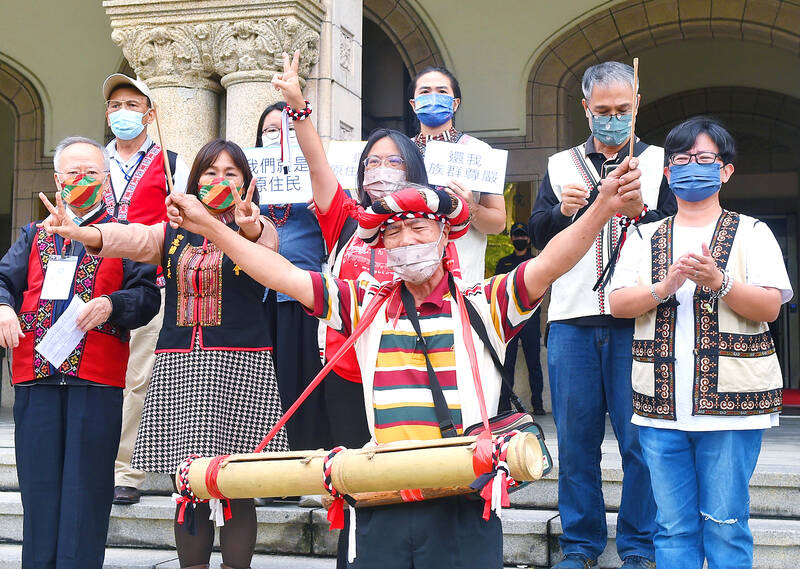The Siraya and other Pingpu groups have the right to be recognized as “indigenous,” the Constitutional Court ruled yesterday as it gave the government a three-year deadline to implement a law to facilitate their recognition.
Reading the ruling, Chief Justice Hsu Tzong-li (許宗力) said that recognition as indigenous should include formerly excluded groups native to Taiwan who speak Austronesian languages and whose culture is related to recognized groups.
Hsu said the ruling was unanimous among the 15 Grand Justices, as judicial officials called such a ruling “quite rare.”

Photo: Liu Hsin-te, Taipei Times
The ruling came after the Council of Indigenous Peoples has for three decades opposed the recognition of about 10 Pingpu groups, including the Siraya.
Council Minister Icyang Parod in June told a Constitutional Court hearing that “recognizing Pingpu groups as indigenous people will adversely affect the rights enjoyed by those who are currently recognized.”
The case was filed by Tainan Siraya Culture Association director Uma Talavan (萬淑娟) after the Taipei High Administrative Court in 2016 ruled against an earlier bid for recognition by the Siraya.
Hsu said that the Constitution guarantees recognition for Austronesian peoples native to the nation who constitute an “ethnic group.”
To prove that, a group would have to present household registration files, including from the Japanese colonial period, when officials comprehensively surveyed households in Taiwan, including the language people spoke at home, Hsu said.
After World War II, most aboriginal groups were registered as “lowland aborigine” or “ mountain aborigine,” but only the latter initially had the chance to be recognized, Hsu said.
However, with yesterday’s ruling, members of Pingpu communities that include elders who speak their original language and have retained Pingpu cultural characteristics would qualify for recognition as an indigenous group, Hsu said.
“They must have the collective identity as an ethnic group,” as well as the required documents to file for recognition, Hsu added.
After the ruling, Uma Talavan told reporters that the Siraya “are happy with this outcome,” calling it a “victory.”
The ruling helps “restore historic justice for us,” she said, but added that it does not automatically result in the Siraya being recognized.
The Council of Indigenous Peoples and indigenous lawmakers might try to impose restrictions that would leave the Siraya without a path to full recognition, she said.
However, Uma Talavan said the ruling is also meaningful for other Pingpu groups, such as the Babuza, Hoanya, Kaxabu, Ketagalan, Lloa, Makatao, Pazeh, Papora, Taokas and Tavalong.
The former regime of the Chinese Nationalist Party (KMT) only recognized “mountain compatriot” groups, initially listing as recognized people the Amis, Atayal, Bunun, Paiwan, Puyuma, Rukai, Saisiyat, Tao and Tsou.
Other groups were added later, starting from when the indigenous council was established in 1996.

INVESTIGATION: The case is the latest instance of a DPP figure being implicated in an espionage network accused of allegedly leaking information to Chinese intelligence Democratic Progressive Party (DPP) member Ho Jen-chieh (何仁傑) was detained and held incommunicado yesterday on suspicion of spying for China during his tenure as assistant to then-minister of foreign affairs Joseph Wu (吳釗燮). The Taipei District Prosecutors’ Office said Ho was implicated during its investigation into alleged spying activities by former Presidential Office consultant Wu Shang-yu (吳尚雨). Prosecutors said there is reason to believe Ho breached the National Security Act (國家安全法) by leaking classified Ministry of Foreign Affairs information to Chinese intelligence. Following interrogation, prosecutors petitioned the Taipei District Court to detain Ho, citing concerns over potential collusion or tampering of evidence. The

Seventy percent of middle and elementary schools now conduct English classes entirely in English, the Ministry of Education said, as it encourages schools nationwide to adopt this practice Minister of Education (MOE) Cheng Ying-yao (鄭英耀) is scheduled to present a report on the government’s bilingual education policy to the Legislative Yuan’s Education and Culture Committee today. The report would outline strategies aimed at expanding access to education, reducing regional disparities and improving talent cultivation. Implementation of bilingual education policies has varied across local governments, occasionally drawing public criticism. For example, some schools have required teachers of non-English subjects to pass English proficiency

‘FORM OF PROTEST’: The German Institute Taipei said it was ‘shocked’ to see Nazi symbolism used in connection with political aims as it condemned the incident Sung Chien-liang (宋建樑), who led efforts to recall Democratic Progressive Party (DPP) Legislator Lee Kun-cheng (李坤城), was released on bail of NT$80,000 yesterday amid an outcry over a Nazi armband he wore to questioning the night before. Sung arrived at the New Taipei City District Prosecutors’ Office for questioning in a recall petition forgery case on Tuesday night wearing a red armband bearing a swastika, carrying a copy of Adolf Hitler’s Mein Kampf and giving a Nazi salute. Sung left the building at 1:15am without the armband and apparently covering the book with a coat. This is a serious international scandal and Chinese

NEGOTIATIONS: The US response to the countermeasures and plans Taiwan presented has been positive, including boosting procurement and investment, the president said Taiwan is included in the first group for trade negotiations with the US, President William Lai (賴清德) said yesterday, as he seeks to shield Taiwanese exporters from a 32 percent tariff. In Washington, US Trade Representative Jamieson Greer said in an interview on Fox News on Thursday that he would speak to his Taiwanese and Israeli counterparts yesterday about tariffs after holding a long discussion with the Vietnamese earlier. US President Donald Trump on Wednesday postponed punishing levies on multiple trade partners, including Taiwan, for three months after trillions of US dollars were wiped off global markets. He has maintained a 10 percent